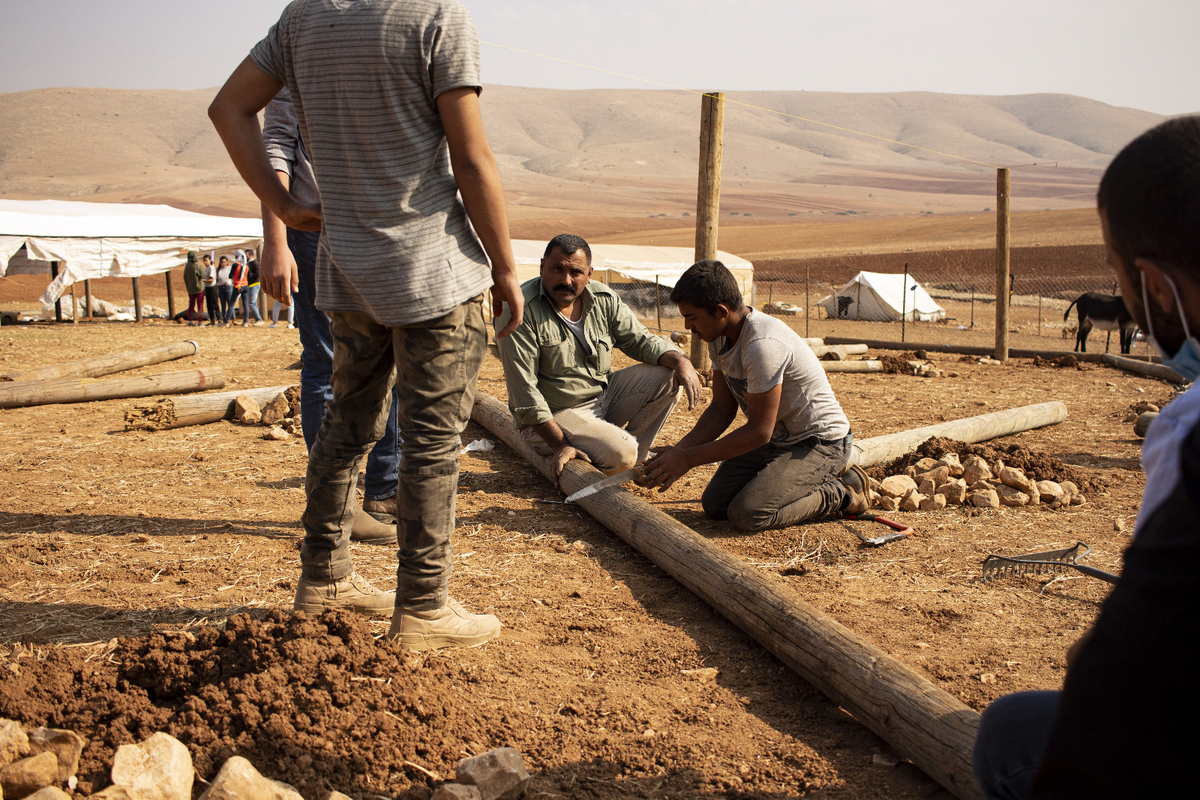Program Update Home Demolition
November 22, 2020 · 3 min reading
GSC joins Faz3a campaign in Khirbet Homsa
Good Shepherd Collective aids Khirbet Homsa rebuilding amidst Israeli demolition, highlighting Faz3a

GSC Staff
info@goodshepherdcollective.org

Last Friday, Good Shepherd Collective joined our partners in resistance on the ground in the village of Khirbet Homsa, recently the site of the largest Israeli demolition in years.The rebuilding was a part of the Faz3a campaign, a campaign that highlights the Palestinian harvest tradition of communities helping one another out during this demanding period. Although the campaign began as an effort to assist Palestinian farmers during the olive harvest—a contentious period filled with violence and harassment by Israeli settlers as many attempts to destroy the Palestinian olive crop—it has continued beyond the main period of the harvest to rebuild demolished Palestinian structures and bring aid and solidarity where they are needed.
Khirbet Homsa is a Bedouin village in the Jordan Valley, a region that was under threat of immediate annexation by Israel earlier this year. Although the explicit threat has quieted, for now, it is clear that the Israeli politicians have no intention of letting go of this highly fertile region, with regular demolition operations and sprawling settlements in the region. Rather, Israeli forces—be they military or civilian—continue to tighten their grip on the Jordan Valley.
On November 3, Israeli military forces carried out a huge demolition in the village of Khirbet Humsa, decimating much of the local infrastructure. The demolition included homes, tents, barns, solar panels, restrooms, water tanks, and more. It impacted over seventy people, more than half of whom are children. Luckily, shortly after the demolition process, volunteers arrived with material assistance.
The Israeli military chose this time, in the middle of a pandemic and difficult economic period for Palestinians to carry out this act of destruction. As calculated and disastrous as this event has been, it is not an evil unique to Israel—this is what settler-colonial regimes do. They use moments of chaos and vulnerability to displace and dispossess the indigenous population, steal resources, and extend their reach into desirable territories. Just the day after this rebuilding, settlers from Havat Ma’on in the South Hebron HIlls attempted to evict a Palestinian family from the village of al Rakeez and take over their home it was only when other local residents arrived that they were able to subdue the settlers. On Friday, the volunteers worked to plant new plants in the village as well as build up the irrigation system to prevent flooding in the village during the rainy season. This is what is important: Palestinians and allies standing together despite the particularly challenging hardship of the moment. It is not just about home demolitions—it is about people across boundaries coming together to rebuild for and protect the dozens of community members who need shelter and infrastructure this winter. It is about showing up for your neighbor not only because they need you to do so, but because it is a politically meaningful act. The Palestinian practice of sumud (steadfastness) is not merely a result of some inherent, stubborn nature—it exists because of the political actions by which we remind each other that we are here, we deserve to be here, and we will help one another remain and work against colonial forces with our time, energy, and resources.
Support
The Good Shepherd Collective rejects the model of large grants from liberal institutions because of the ways it can shape the work. Instead, we premise our work in the financial investments from individuals who believe in the future we're trying to build. Consider becoming a monthly donor.
Donate